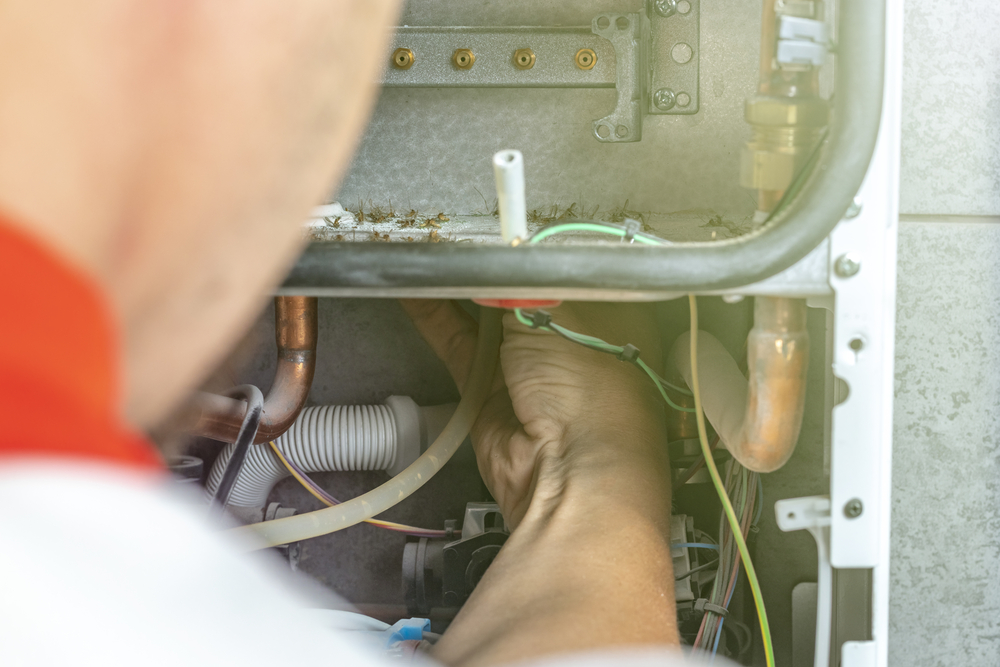Boiler breakdowns are annoying and seriously inconvenient at the best of times, but should they occur during the winter, or involving a gas leak, they can also be extremely dangerous and it is essential to take swift action to protect your home and loved ones.
Boiler repairs can be expensive, but the cost of failing to tackle problems before they escalate is far worse, and the cost of your family’s safety is priceless. By using an experienced Gas Safe engineer to perform boiler repairs you ensure that any repairs are conducted safely and legally and that your gas boiler is firing on all cylinders once again in no time at all.
Read on to discover exactly what to do in the event that your gas boiler breaks down.

Staying safe during a boiler breakdown
In the majority of cases a broken boiler will simply not turn on at all or will fail to produce the pressure required to meet the heat requirements of your home. Whilst this is annoying, especially during the winter months, as long as you have plenty of blankets about there is no serious threat posed to you or other residents and you can simply wait it out under a gas Safe Engineer arrives.
However, in rare instances, boiler issues requiring boiler repair Glasgow services can present serious health and safety issues and should be treated extremely carefully as a result. Unfortunately, the issues that have the potential to do the most harm, namely gas and carbon monoxide leaks, are the hardest to pot and you will need to look out for some more subtle indications that a problem exists, rather than your hot water tap simply not working.
Modern boilers are fitted with a range of highly effective safety features built in to prevent safety issues but if you have an older boiler or do not have your boiler serviced on a regular basis, it is important to know the signs of danger you need to look for.
The moment that you smell gas inside your home, turn off the boiler immediately, leave the property and call the Gas Emergency service. In Scotland the number for this service is 0800 002 001.
If you experience any of the symptoms of carbon monoxide poisoning, headaches, dizziness, nausea, etc. with no obvious cause, you should also have your boiler examined to check for a potential leak. In order to guard against carbon monoxide leaks make sure that you have a fully operational carbon monoxide detector in place.
If your boiler breaks down in a more conventional manner, due to a faulty part or lack of pressure during the colder months of winter, you may have to wait a certain amount of time for a Gas Safe engineer to have the availability to come and repair it. After all this is by far their busiest time of the year. Staying safe and warm during the winter, especially for the elderly, is a challenge at the best of times but without a boiler you need to be particularly careful. Without central heating, add extra layers of clothing, leave your curtains closed even during the day to retain heat, and if you think things are getting out of control, move to a friend or family member’s house, or rent a hotel room until the issues have been resolved.
Who should you get to fix your boiler?

DIY boiler repair is not only dangerous, attempting it will likely invalidate any warranty or insurance that you have. If you do indeed still have a warranty on your boiler, the details of who to call in the event of a breakdown should be stated in the paperwork.
If not, check the Gas Safe Register for details of local heating engineers in your area with the skills, qualifications, and experience to carry out the repairs required. Appearing on the register is a good indication that an engineer is safe to use but make sure to check their identity card when they arrive to ensure they are who they say they are and have the required licencing to perform repairs on gas appliances.
Before an engineer visits, give them as much information about the problems you are having and the make and model of your boiler as possible. They may well be able to help you diagnose or even fix your problems over the phone but if not, this information will allow them to bring the tools and parts they expect to need with them on their first visit, reducing the risk of further delays whilst they order them in.
They will also let you know if they believe that the problems you are dealing with pose a safety threat and whether or not you need to leave the property.